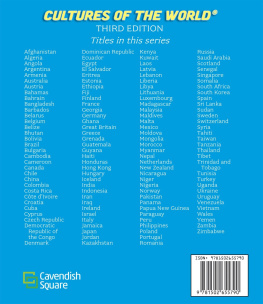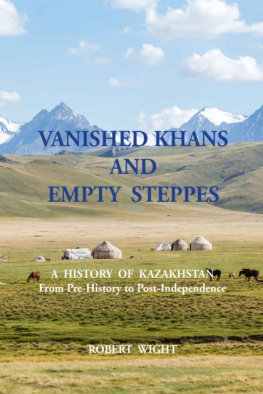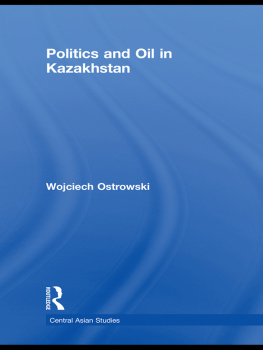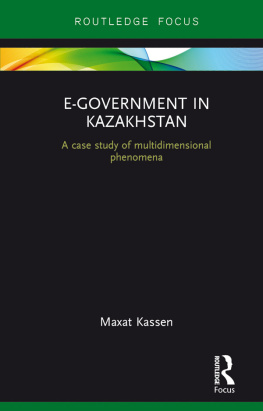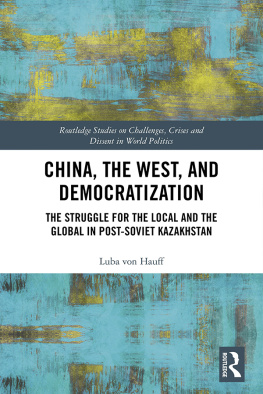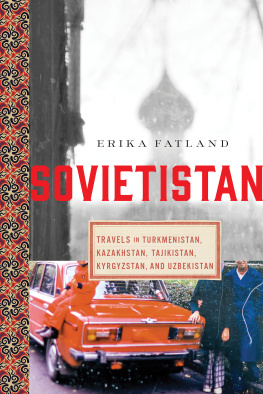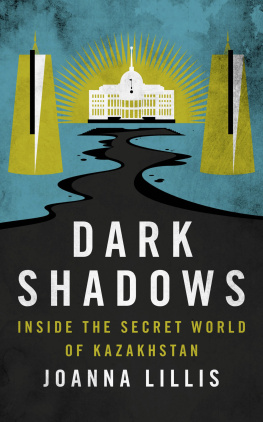
Published in 2020 by Cavendish Square Publishing, LLC
243 5th Avenue, Suite 136, New York, NY 10016
Copyright 2020 by Cavendish Square Publishing, LLC
Third Edition
No part of this publication may be reproduced, stored in a retrieval system, or transmitted in any form or by any meanselectronic, mechanical, photocopying, recording, or otherwisewithout the prior permission of the copyright owner. Request for permission should be addressed to Permissions, Cavendish Square Publishing, 243 5th Avenue, Suite 136, New York, NY 10016. Tel (877) 980-4450; fax (877) 980-4454.
Website: cavendishsq.com
This publication represents the opinions and views of the author based on his or her personal experience, knowledge, and research. The information in this book serves as a general guide only. The author and publisher have used their best efforts in preparing this book and disclaim liability rising directly or indirectly from the use and application of this book.
All websites were available and accurate when this book was sent to press.
Library of Congress Cataloging-in-Publication Data
Names: Pang, Guek-Cheng, 1950- author. | Bryan, Bethany, author.
Title: Kazakhstan / Guek-Cheng Pang and Bethany Bryan.
Description: Third edition. | New York: Cavendish Square Publishing, 2020.
| Series: Cultures of the world | Includes bibliographical references and index.
Identifiers: LCCN 2019055977 (print) | LCCN 2019055978 (ebook) | ISBN
9781502655790 (library binding) | ISBN 9781502655806 (ebook)
Subjects: LCSH: Kazakhstan--Juvenile literature.
Classification: LCC DK903 .C49 2020 (print) | LCC DK903 (ebook) | DDC
958.45--dc23
LC record available at https://lccn.loc.gov/2019055977
LC ebook record available at https://lccn.loc.gov/2019055978
Editor: Kristen Susienka
Copy Editor: Nathan Heidelberger
Designer: Jessica Nevins
The photographs in this book are used by permission and through the courtesy of: Cover Yerik Kalibayev/Moment Open/Getty Images; pp..
Some of the images in this book illustrate individuals who are models. The depictions do not imply actual situations or events.
CPSIA compliance information: Batch #CS20CSQ: For further information contact Cavendish Square Publishing LLC, New York, New York, at 1-877-980-4450.
Printed in the United States of America


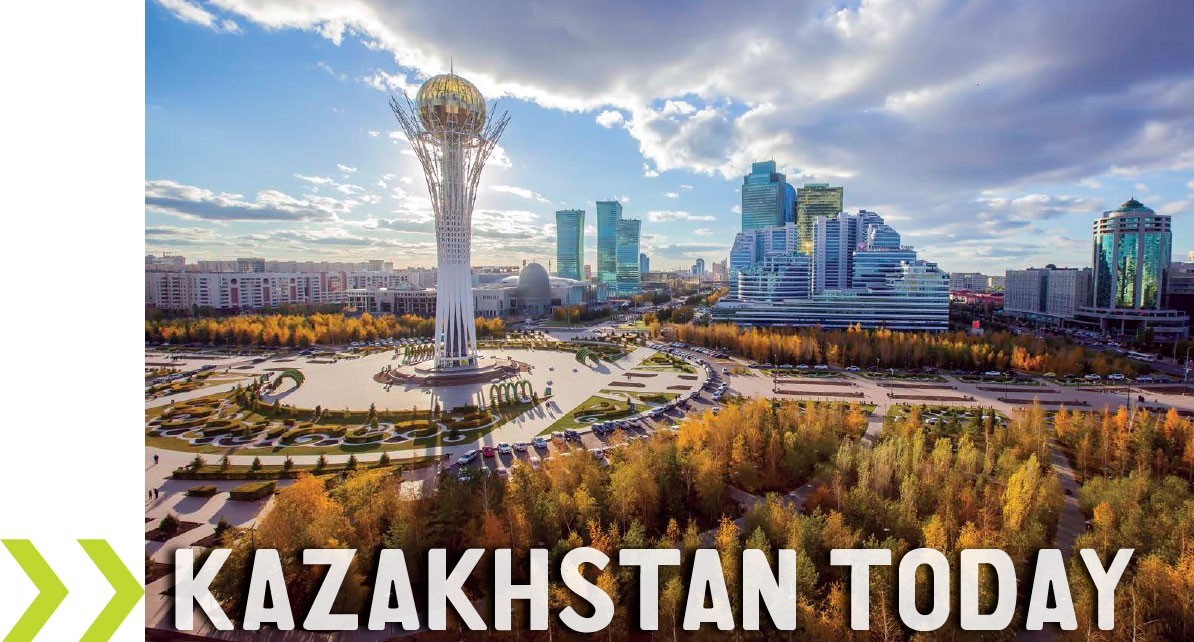
T he name Kazakhstan comes from the word kaz, a Turkic word that means to wander, and the Persian word stan, which means place or land of. Kazakhstan is, therefore, a land of wanderers. It is a region that united a people of nomadic, or wandering, tribes. They dealt with invasions from outside attackers and integrated, or mixed, with former enemies to form new tribes. In the late 15th century, the peoples finally joined together under the name Kazakhsa group of free wanderers.
LOSS OF INDEPENDENCE
The united Kazakhs were under constant threat. They were in a precarious, or delicate, location, between Russia and China, and amid groups of invading Mongols. By 1822, they accepted protection from Russia, giving the larger country some control of their lands in exchange. This act would eventually take away the free-wandering lifestyle that Kazakhs had enjoyed for centuries. The Bolshevik uprising of 1917 turned Russia into the Union of Soviet Socialist Republics (USSR), which sought to industrialize Kazakhstan and tame its wild and free-roaming people. In 1936, Kazakhstan would officially become a full republic of the USSR. Many Kazakhs fled the oppressive Soviet regime and the famine that resulted as a traditionally nomadic people saw their herds seized and were forced to farm the dry steppe regions of Soviet Kazakhstan. The ones who stayed saw their culture surrender to communism and their traditions all but disappear. For the next several decades, the idea of an independent Kazakhstan faded away for many Kazakhs. In 1991, however, the Soviet Union collapsed, and Kazakhstan finally declared itself an independent nation.
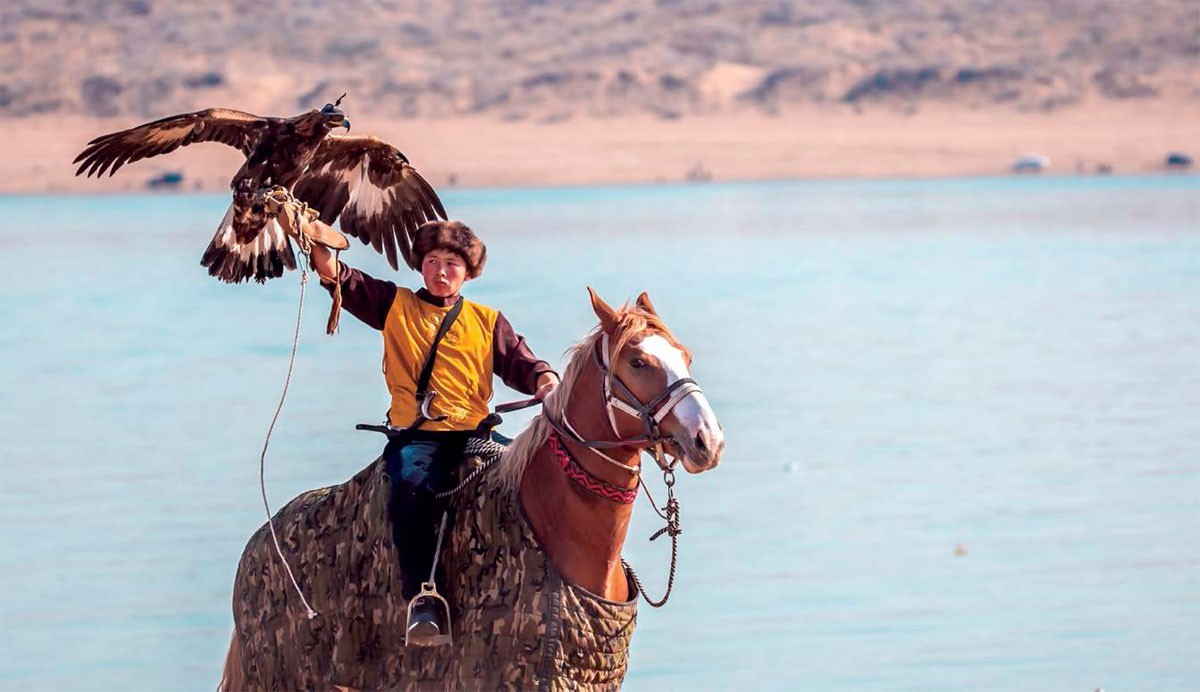
Free from Communist Party rule, many Kazakhs can again embrace the nomadic lifestyle that shaped their culture.
TODAYS INDEPENDENT KAZAKHSTAN
Today, Kazakhstan is a nation that continues to struggle with its identity. During Soviet rule, Kazakhs adapted to the principles of communism. They adopted elements of Russian culture, like food and literature. They became used to giving up the things that made them proud Kazakhs.
As an independent state, Kazakhstan is finally seeing many of its people return, after years of living in countries like China and Mongolia. Its pushing aside Russian influences, making sweeping changes to language, architectural styles, and even the currency, to put the Kazakh Soviet Socialist Republic in its past. Kazakhs are hoping that these changes will establish a sense of independence from Russia once and for all, and pave the way to a bright future.
One of the biggest steps forward that Kazakhstan has taken is in its economy. Kazakhstan is rich with fossil fuels like crude oil and natural gas. This makes it stand out among the rest of the countries in Central Asia. Its location between China and Russia now makes it an ideal and powerful trading partnerand Kazakhstan is ready to trade. The economy is booming, with the gross domestic product (GDP), or total value of goods and services produced within the country, steadily rising year after year. This healthy economy has given Kazakhstan some ability to partner with international investors on expanding its infrastructure, building roads, pipelines, and railroads that reduce its reliance on Russia for help transporting goods out of the landlocked nation.
In the 21st century, business is booming for Kazakh architects, designers, and engineers as cities are growing and as structures built while the country was under Soviet rule are being replaced. Kazakhs are moving to cities in droves. Government officials are also aware that an economy dependent on finite natural resources isnt necessarily a stable one, so the government is beginning to invest in green, or environmentally conscious, and sustainable technologies. Theyre also working to reverse some of the damage caused by nuclear testing and the coal industry in decades past.
GOVERNMENT SHIFTS
Big changes are happening within the governments leadership as well. Longtime president Nursultan Nazarbayev, who came to power before Kazakhstan was an independent nation, stepped down in March 2019 after 29 years. He was replaced by Kassym-Jomart Tokayev, who Nazarbayev had chosen as his successor, although his role as president wasnt official until elections took place in June 2019. As president, Nazarbayev ushered Kazakhstan into a new era, working through the economic hardship of the early stages of independence and helping to construct a government, a constitution, and a long-term plan for success. While he was no doubt influential, many feel that his departure is another step toward putting communism firmly in Kazakhstans past.

